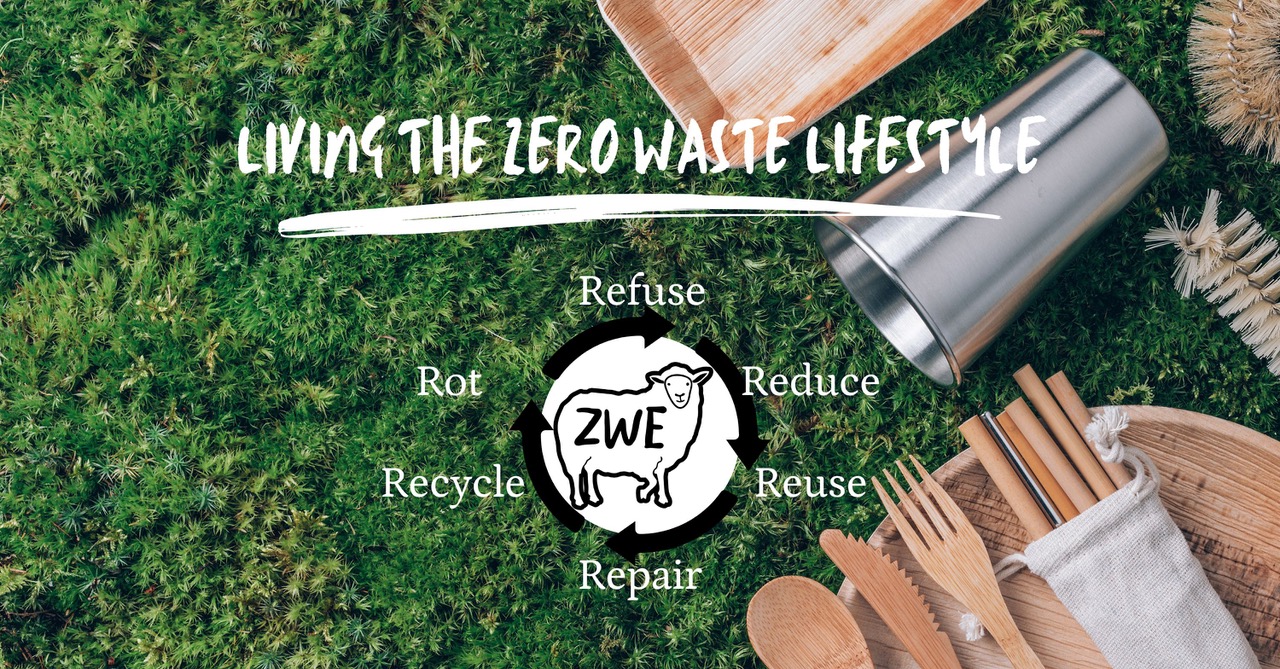Living the Zero Waste Lifestyle
As we continue to celebrate the launch of our Zero Waste Ewe-nitiative®, we thought we’d highlight each element of the pillars that form a holistic zero waste approach.

The Rs
The initial five, credited to Bea Johnson in her book Zero Waste Home are Refuse, Reduce, Reuse, Recycle, and Rot. Many have added other Rs depending on their particular circumstances, and for ours, we’ve added Repair, a skill that has rapidly fallen off our radar in just a few generations. Think of your grandparents, and you’ll likely see that they knew how to repair many things, from mending clothing to fixing cars. Our modern lives are built upon instant solutions to problems, whereas our ancestors would’ve had to employ a good dose of creativity and patience. Unfortunately, the majority of these quick and easy solutions are also temporary, problematic for multiple reasons like labor and global shipping, and not environmentally friendly.
Depending on your own personal way of going about life, you may feel up to taking on the challenge of these principles all at once, or maybe you’re more of a slow-and-steady-wins-the-race type. It’s important not to get overwhelmed, or to let perfection be the enemy of the good. Every step we take in the right direction is beneficial, and awareness is a large part of the effort.
Making It Real
Guided by the six pillars of our Zero Waste Ewe-nitiative, here are some ways you can begin to incorporate some zero waste mojo into your life.
- Refuse & Reduce— It’s important to get in touch with our values and align our purchasing and acquiring of things with those values. The potential economic effects of these steps are powerful! Ask yourself:
- Do I need it? Don’t allow anything through the door that doesn’t align with your values. Be especially aware of freebies and promotional materials. Before bringing anything new in, use up what you’ve already got on hand.
- Can I reuse/repair/refresh something I have? The solution may already be handy.
- Can I get it in a less wasteful way? Consider shopping in the bulk foods section of the grocery store with your own reusable (hopefully non-plastic) containers, and find restaurants and cafés that allow you to use your own containers for takeout food and beverages. Have washable, reusable alternatives for straws and silverware.
Here in our community in Southern Oregon, we have a local organization called Rogue To Go offering a service that provides and manages reusable takeout food containers for participating restaurants. Ideas like these help prevent single-use plastics from ending up in landfills.
- Reuse & Repair— In the spirit of Refusing and Reducing, Reuse and Repair open our eyes to the amazing abundance of what is already around us. Our consumer-driven world of shiny advertising can convince us that we need new things constantly, and this entrains our system to seek rewards through shopping. What’s needed is a new sense of satisfaction in being resourcefully creative and capable. Try:
- Mending and repairing
- Handing down and seeking hand-me-downs
- Regifting
- Buying and selling second hand
- Reusing containers and items that can be cleaned instead of disposed
Products that carry our ZWE badge are made from reused scraps of cotton and wool from our production cycle. (Be sure to check our Instagram feed during our ZWE launch for the chance to win some!)
- Paper Towels
- Reusable Face Wipes (Check out our Instagram feed for more on these this Friday!)
- Wool Dryer Balls
Many communities have Buy Nothing groups that are founded on the idea of a gift economy, wherein members request and offer goods and services for free. Look for a group near you on Facebook or at their website.
- Recycle— As wonderful as it sounds, unfortunately recycling programs aren’t as robust as we’d like. By many accounts, only 5-6% of plastics in the US are being successfully recycled, meaning the rest ends up in landfills. Committed zero wasters try to avoid this step as much as possible by employing the other upstream principles.
- First, reconsider the purchase of anything that would require recycling.
- Secondly, recycle smarter.
- Research local resources for creative recycling solutions.
- If an item can’t be recycled in its entirety, consider recycling component parts.
- Check out our resource page about mattress recycling!
- Rot— Ideally, all consumer goods would return to nature where their primary materials came from. And beyond that, wouldn’t it be great if it was beneficial to the soil and ecosystem? (Check out our wool mattress and other materials composting at our production site!)
- Another great reason to avoid plastics…let’s see if we can leave less of a trace!
- If you’ve got a yard, set up a composting pile or bins. If you don’t, research alternative composting systems, there are many options available. Check to see if your community participates in a composting program.
- Food waste accounts for nearly half of a household’s total waste. At the grocery store, buy from the bulk section with your own containers, and ask the butcher and deli counters to wrap your meat and cheese in paper. Eating real food is not only better for the planet, it’s healthier for you too.
- Look for everyday items made from compostable natural materials—that bamboo toothbrush can go on the pile.
- If single-use disposables are somehow unavoidable, seek out compostable versions.
Follow us on Instagram and Pinterest for more #zerowaste and #plasticfree tips!

